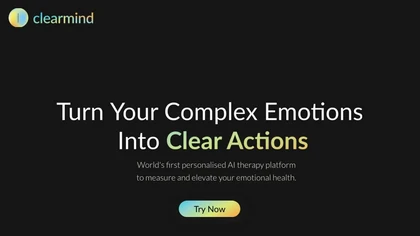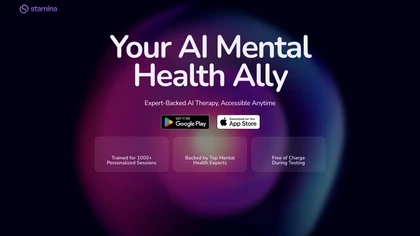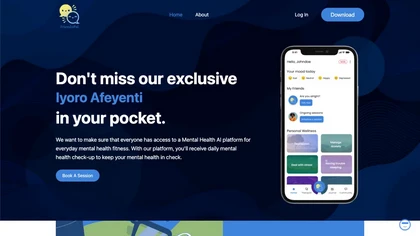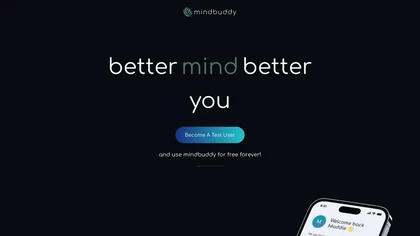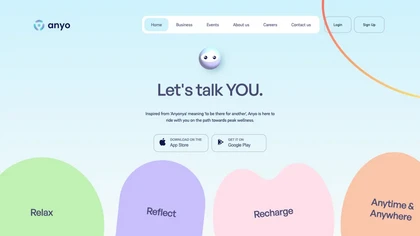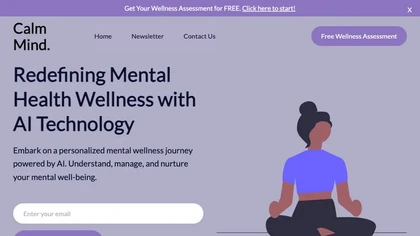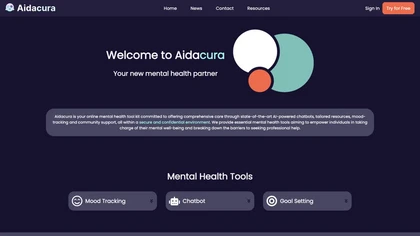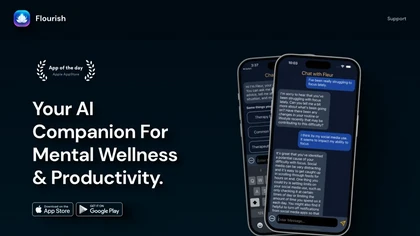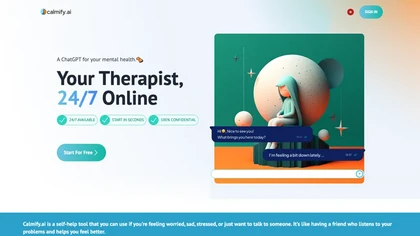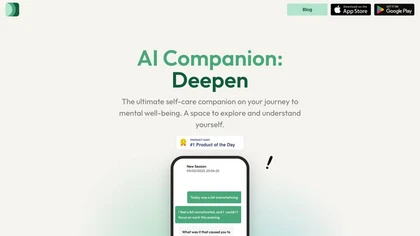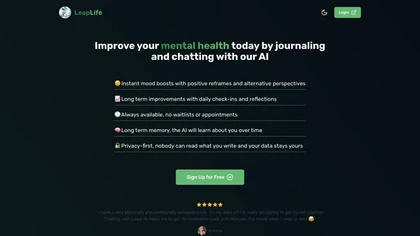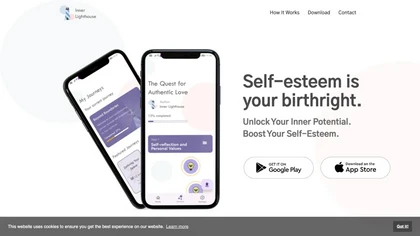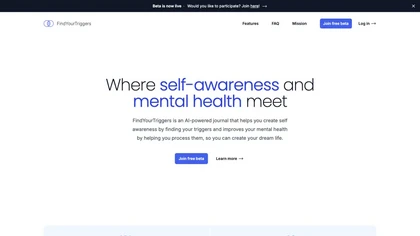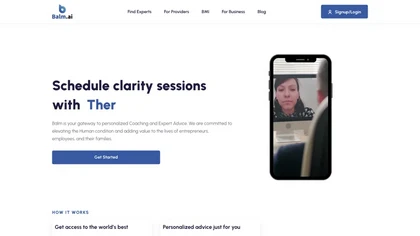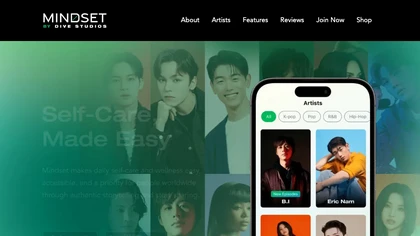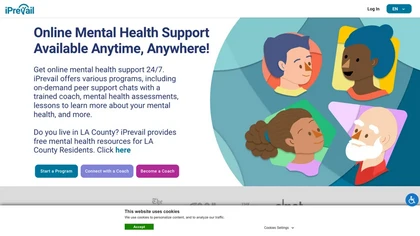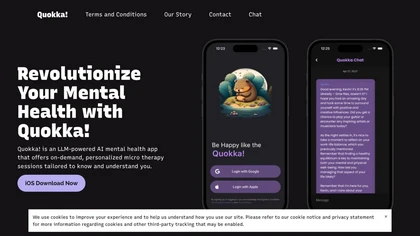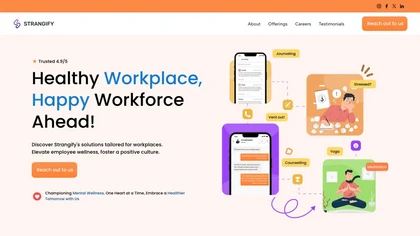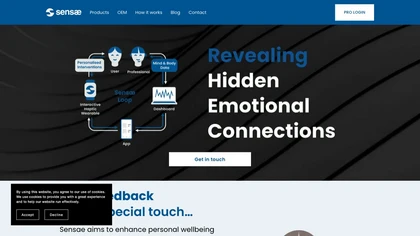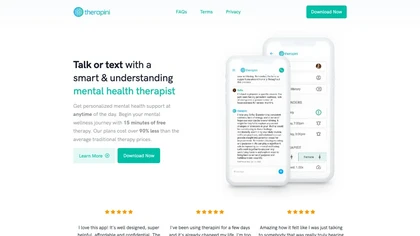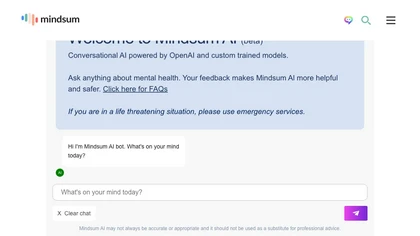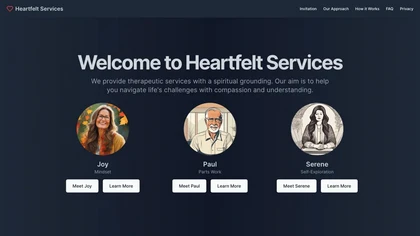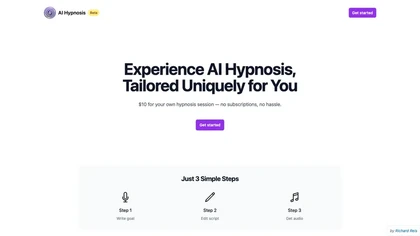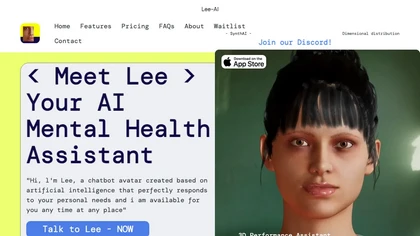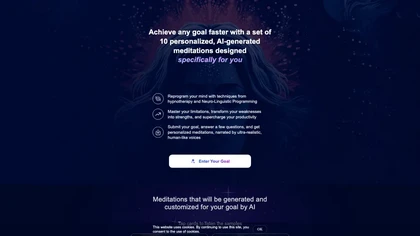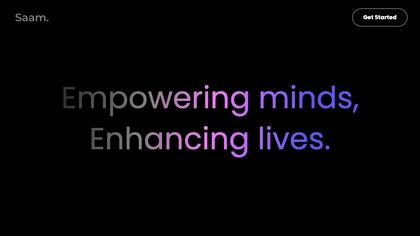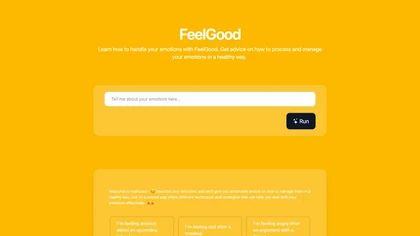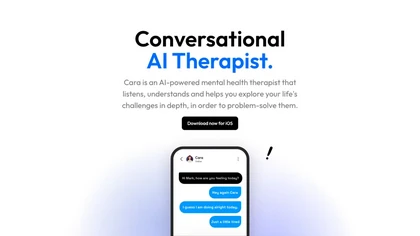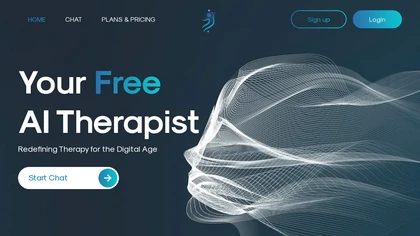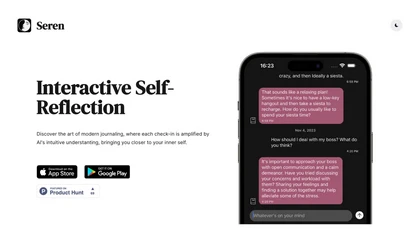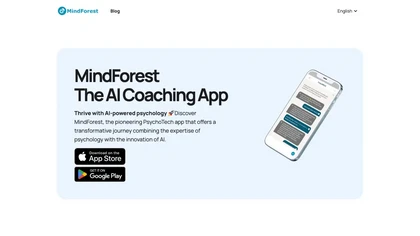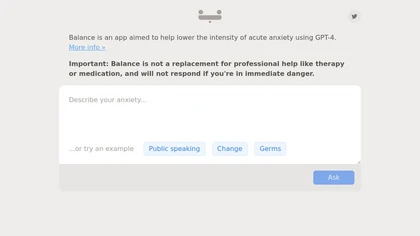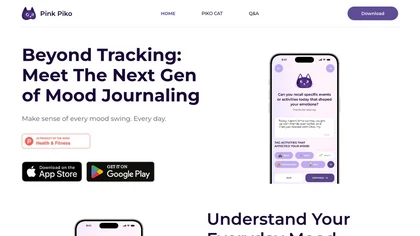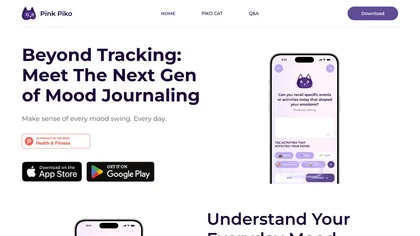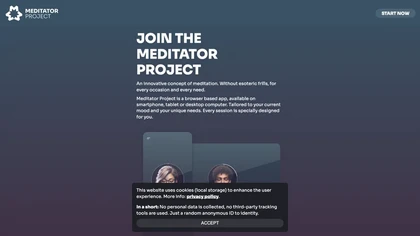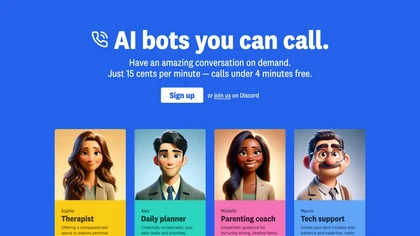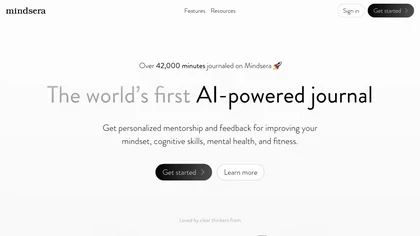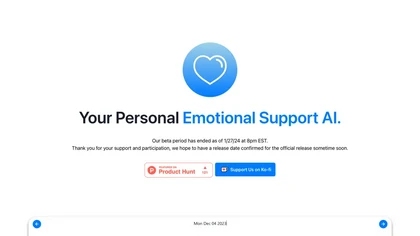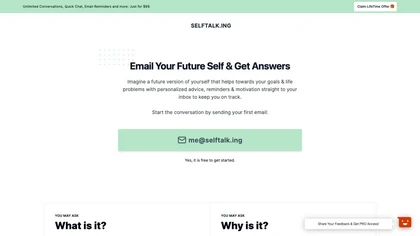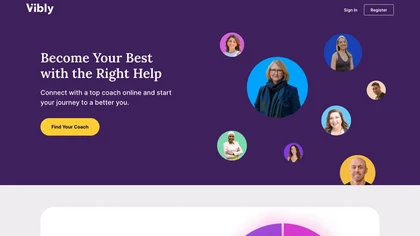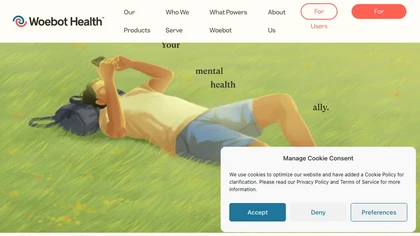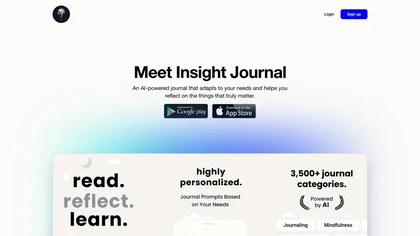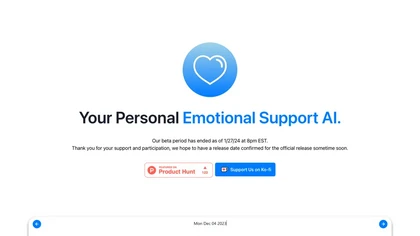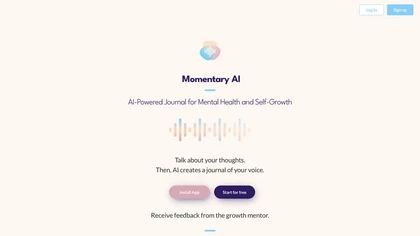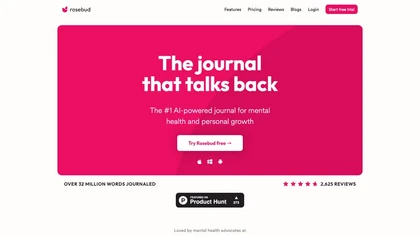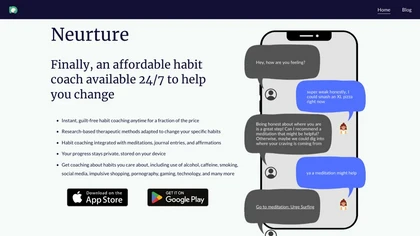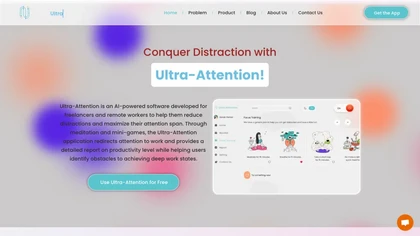AI use cases for Mental well-being
Generative AI can be applied in various applications for mental well-being. Here are some examples to explore below for inspiration with AI tools to get you started with using AI in mental well-being.
🛠️ 70 AI tools for Mental well-being
Explore a dynamic list of some of the most popular tools to get you started with various AI use cases and applications for Mental well-being to streamline your workflows and productivity today.
Clearmind features
- To-Do lists
- Mood cards
- Meditation scripts
- Chat
Space of mind features
- Affordable PTSD support
- Facilitated peer support
- Anonymous therapist help
- Licensed therapist-guided sessions
- Range of support spaces
Stamina AI features
- Expert-backed AI therapy tool
- Over 1000 personalized sessions
- Cognitive behavioral therapy techniques
- 24/7 availability
- Personalized support from a team of 200+ mental health professionals
FriendnPal features
- virtual one-on-one chats with therapists
- supports various African languages
- booking therapy sessions online
- ASMR sounds for relaxation and stress relief
- digital journal for mood tracking
mindbuddy app features
- Specially trained chatbot 'buddy'
- Specialization in cognitive behavioral therapy (CBT)
- Personalized guidance through AI
- Track mood and access past chat sessions
- Continuous learning and adaptation capabilities
Anyo features
- Personalized self-care activities
- Resilience building through Carebox
- Real-time connections with listeners
- Seamless booking of therapist appointments
- High-quality content in yoga, psychology, meditation
CalmMind features
- Wellness assessment
- Calmmind chat
- Curated wellness programs
- Therabot
- Community support
🔥
Create your account, save tools & get personal recommendations
Receive a weekly digest of our handpicked top tools.
Unsubscribe anytime
Well Me Right features
- AI matching and Health Coach capabilities
- Personalized coaching
- Dietary tracking, nutritional guidance
- Guided meditation sessions
- Adaptive health partner
Aidacura features
- AI-powered chatbots
- Tailored resources
- Mood-tracking
- Community support
- Natural language processing
Vital features
- Personalized audio-guided sessions
- Selection of eight specific meditation techniques
- Six different AI meditation coaches
- Automated email guidance
- Community building through practice comparisons and point system
Flourish features
- Meaningful Conversations
- Psychology-based Mental Health Assessments
- Stress Relief Tools
- Productivity Tools
- Quality Mental Health Support
calmify.ai features
- AI-powered mental health companion
- 24/7 online support
- Personalized and empathetic assistance
- Employing evidence-based cognitive behavioral therapy (CBT) strategies
- Uses state-of-the-art large language models (LLMs)
Deepen features
- Chat sessions with AI companion
- Guided conversations
- Insights dashboard
- Supports exploration and understanding of emotions
- Aids in decision-making
LeapLife features
- AI chat function
- Personalized chatting AI
- Daily journaling
- AI therapists chat
- End-to-end encryption
HeartDialog features
- 24/7 availability
- Personalized conversations
- Privacy protection
- Context tracking
- Integration of journaling, meditation, and CBT
MindwellAI features
- Self-care
- Coping tools
- Journal writing
- Coaching
- Anxiety management program
Inner Lighthouse features
- Structured approach towards self-esteem improvement
- Variety of expertly curated journeys
- Daily 10-minute cognitive exercise sessions led by professional psychologists
- Privacy and security measures
- Integration into daily routine for well-being enhancement
Ponder features
- Tailoring guided meditations to emotional needs
- Personalizing meditations based on current emotions and situation
- Offering flexible meditation options
- Providing structured courses for meditation
- Adapting to support the user's self-discovery and growth journey
FindYourTriggers features
- AI-powered journal
- Generates prompts based on user input
- Tracks user moods
- Identifies and processes behavior triggers
- Supports a structured three-step plan of assessment, planning, and implementing
Balm.ai features
- Personalized coaching
- Access to top experts
- 1-on-1 virtual sessions
- Tailored advice
- Convenient expert connection
Mood AI by Mindset features
- Daily check-ins
- Daily reflections
- Expert advice
- Daily quotes
iprevail.com features
- Personalized wellness programs
- User-friendly interface
- Self-help modules
- Therapy sessions
- AI algorithms for progress tracking
Quokka! features
- Personalized micro therapy sessions
- 24/7 access to affordable AI-powered therapists
- Truly personalized chat experience with a GPT-4-powered AI therapist
- Exploring deep dive features for gaining insights and advice on specific mental health topics
- Using HRV data from biometrics like the Apple Watch to interpret mood changes over time
MoodPen features
- Real-time reflection
- Personal growth tracking
- Automated journal reflections
- Personalized feedback and suggested actionable steps
- Multi-lingual support
Lotus features
- AI therapist functionality
- Cognitive behavior therapy (CBT)
- Virtual therapist interaction
Strangify features
- Real-time crisis intervention
- Professional counseling sessions
- Supportive community of listeners and licensed counselors
- Anonymous connection for users to express thoughts and feelings
- Access to resources for mindfulness practices like yoga and meditation
Sensae Loop features
- AI-driven analytics
- Haptic biofeedback
- Physiological and emotional state monitoring
- Stress assessment
- Modular and customizable solutions
AMARI features
- AI mental health coach
- Accessible through WhatsApp
- Personalized advice
- 24/7 support through text
- Stress management
therapini features
- Personalized support and guidance
- Navigation of common therapy FAQs
- Confidential mental wellness assistance
- Communication via talk or text
- Practical and encouraging tailored advice
Bobby Chat features
- AI-powered wellness companion
- Chat-based interface
- Resources for self-improvement
- Empowerment focus on women in the workplace
- Tools for developing healthy coping mechanisms
Mindsum features
- Answer mental health-related queries
- Offer custom train models
Heartfelt Services features
- Virtual therapists (e.g., Paul and Serene)
- Innovative approach to self-exploration and healing
- Confidentiality prioritization
- Non-judgmental space for users
- Team of dedicated therapists
AI Hypnosis App features
- Customized hypnosis sessions tailored to individual goals
- Ability to input goals and edit scripts for personalized audio files
- Utilizes OpenAI Elevenlabs for audio generation
- Secure transactions through leading financial service Stripe
- No subscriptions, just a one-time payment for tailored sessions
BodyGuru features
- Personalized wellness routines generation
- Tailored recommendations
- Free platform
- Upcoming features integration
- Developed by JBBAE
LeeAI features
- 3d performance assistant
- Robotic life coach
- Utilizes chatgpt-4
- Data privacy
Neomind features
- Personalized meditations generated by AI
- Utilizes hypnotherapy and neuro-linguistic programming techniques
- Customization based on user's specific goal and needs
- Narrated by ultra-realistic, human-like voices
- Accompanied by a 53-page workbook with science-backed exercises and NLP techniques
6000 thoughts features
- Organize thoughts
- Clarify thinking
- Identify biases
- Achieve breakthroughs
- Self-reflection
Drsaam features
- Journaling
- Friend integration
- Confidentiality
- Privacy
- Security
Dr. FeelGood features
- Personal AI motivational coach
- Human-like understanding
- Powerful motivational capabilities
- Available 24/7
- Coaching sessions anytime needed
FeelGood
4.2FeelGood features
- AI-powered
- Emotion analysis
- Actionable advice
- Personalized techniques
- Support emotional well-being
Cara features
- Conversational AI therapist
- Powered by GPT
- Natural responses and advice
- Insightful and non-judgmental guidance
- Available on iOS
Lily features
- Voice-activated AI
- Personalized guidance for mental health
- Support for anxiety, stress, self-esteem
- Digital wellness guide
- Privacy and tailored support
Therapy with AI
4.9Therapy with AI features
- personalized therapy
- learns from conversations
- provides guidance
- effective coping strategies
- privacy and confidentiality
Yuna AI features
- AI-powered mental health companion
- Available 24/7
- Offers calming techniques
- Confidential conversations
- Assists in tracking emotions
Shoorah Wellbeing features
- Privacy prioritization
- Advanced algorithms
- Secure and confidential platform
- Maintaining data privacy
- Safe and trusted space
Insightful features
- Provide personalized on-demand coaching
- Focus on specific needs
- Available anytime, anywhere
- Blog with latest insights on living a fulfilling life
- Accountability coaching to help young professionals reach full potential
Seren features
- AI-powered interactive self-reflection journaling tool
- AI chat functionalities for insightful feedback and guidance
- Delve deeper into emotions and thoughts
- Secure and private space for self-discovery
- Encrypted conversations and focus on privacy
MindForest features
- AI-powered psychology for personal growth
- Insight Journal feature for automatic journaling
- Tailored insights and exercises based on psychological principles
- Psychometrics assessments for understanding personality facets
- Integration of psychology expertise with AI innovation
Balance features
- Provides immediate support for individuals with anxiety
- Challenges anxious thoughts
- Assists in reducing the intensity of anxious thoughts
- Offers features to address specific anxieties such as public speaking or germ phobia
- Uses gpt-4 to provide assistance
Buddiz features
- Personalized learning paths
- Real-time insights
- Interactive challenges
- Automated grading
- Mental health support
AtFirst features
- Affirmations
- Relaxation sessions
- Self-help guides
- Community feature
- Guided sleep affirmations
PinkPiko features
- Mood tracking
- Interactive experience
- Insightful questions
- Personalized emotional insights
- Actionable insights
Pink Piko features
- Interactive tracking experience
- Insightful questions for emotional reflection
- AI-powered technology for interpreting mood logs
- Personalized emotional insights
- Transforms emotional data into tangible insights
Meditator.pro features
- Browser-based app
- Available on smartphones, tablets, and desktops
- AI-guided meditation tool
- Choose between two AI coaches
- Specially designed meditation sessions
Soula Care features
- Personalized AI-based chatbot
- Evidence-based and structured content
- Holistic pregnancy planner and tracker
- Mental health support
- Access to top experts in the field
Call an AI features
- Conversational AI tool
- Available via phone
- Range of AI companions
- Personalized AI experience
- Future developments
Mindsera features
- Mentor model
- Mindset analysis
- Automatic summaries
- Habit tracking
- Dark mode
Reassurance AI (Beta) features
- Interactive chatbot named Sai for guidance and advice
- Personal journal for logging thoughts and self-reflection
- Customization options for fonts, sizes, and speech voices
- Tracking of interactions with Sai and journal entries
- Subscription for updates on future releases and features
Selftalk.ing
4.9Selftalk.ing features
- Unlimited conversations with future self
- Quick chat interface
- Email reminders
- Personalized advice and motivation
- Access to past conversations
Vibly features
- AI matching algorithm
- Personalized coach recommendations
- Tailored coaching experience
- Evidence-based techniques
- Convenient online coaching sessions
Woebot Health features
- Conducting mental health assessment
- Providing personalized mental health support
- Accessible via text message or web browser
- Grounded in clinical research
- Easy-to-use interface
Cerebral Ai features
- AI-powered meditation app
- Variety of soundscapes for inner peace and deep sleep
- Daily guided meditations using AI-created calming soundscapes
- Tailored mindfulness recommendations
- Enhancing relaxation and mindfulness through synthetic voices and calming sounds
Insight Journal features
- AI-powered
- Intuitive interface
- Organize thoughts
- Track progress
- Privacy and security
Reassurance features
- Personal emotional support through AI chatbot
- Customization of responses with various fonts and text-to-speech options
- Maintaining a personal journal for logging thoughts and concerns
- Remembering past conversations for continuity
- Interaction tracking based on user inputs and responses
Momentary features
- AI-powered journaling experience
- Voice-activated journaling
- AI-powered transcribing
- Mood categorization
- Supportive AI mentor
Rosebud features
- Daily check-ins
- Auto-tagging key insights
- Identify meaningful goals
- Track people, topics, and moods
- Emotionally-focused capabilities
Neurture features
- Affordable habit coaching
- 24/7 availability
- Utilizes research-based therapeutic methods
- Integrated with meditations, journal entries, and affirmations
- Allows digitization of handwritten journal entries
Pneuma features
- Augmented reality integration
- Personalized meditation sessions
- State-of-the-art technology
- Intuitive interface
- Guided breathing exercises
Ultra-Attention features
- Meditation mini-games
- Detailed productivity reports
- Machine learning for detecting working habits
- Tracking eye, mouse movements, and facial expressions
- Limiting unnecessary or distracting applications
DayBright: Daily Inspiration features
- Delivers daily wisdom nuggets across various topics
- Allows sharing and saving advice easily
- Provides scientifically backed content
- Offers interactive widgets for quick access to inspirations
- Auto-refresh feature and customizable notification settings
